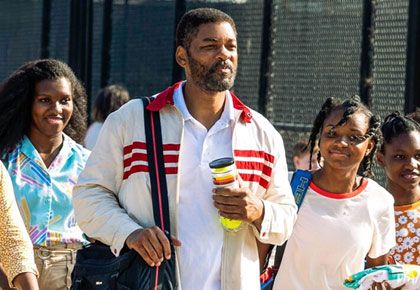Will Smith, who had once portrayed the irreverent Muhammad Ali with such aplomb, brings the character of Richard Williams alive.
The accent, the dialect, the body-language and the ever-present chip on the shoulder, observes Deepti Patwardhan.

Right at the end, we are given the career summary of Venus and Serena Williams: 'Venus, the first African-American to be ranked Number 1 in the world. Serena, the 23-time Grand Slam champion is considered the greatest of all time.'
The list of their achievements is long, and their struggle well-documented.
But the latest sports biopic King Richard is the origin story of tennis's wonder women.
As the name suggests, the movie is based on Richard Williams, their father, and his one crazy dream changed tennis forever.
The foundations of the film are laid right in the first scene when Richard is shown hustling for coaching and sponsor support for his daughters.
There itself, we learn that Williams decided that his future kids will become tennis champions after seeing on television a female tennis player Virginia Ruzici from Romania, was awarded $40,000 for winning a four-day tournament in 1980. He, meanwhile, made $52,000 a year. Tennis, he believed, was their ticket to a life of prosperity.
Born in Shreveport, Lousiana, in the 1940s, when he discloses later in the movie, black people were not even allowed to touch whites, Richard had no formal training in tennis.
He watched videotapes and watched the game on TV to learn it himself.
Then, he made a 78-page plan to tennis greatness for his daughters.
The reason why the world is still so enamored by the Williams sisters, and why the film works, is their father's audaciousness.
Of how he led Venus and Serena Williams to their pre-determined destinies with such meagre resources and expertise.
Of his dream of seeing his daughters conquer an all-white sport while learning the basics of the game on public courts of Compton, California where danger, and distraction, always lurked.
Will Smith, who had once portrayed the irreverent Muhammad Ali with such aplomb, brings the character of Richard Williams alive.
The accent, the dialect, the body-language and the ever-present chip on the shoulder.
The movie has pinned down the technical aspects of the sport of Venus (played by Saniyya Sidney) and Serena's (Demi Singleton) game.
Legend has it that Richard scattered broken pieces of glass at the back of the court to make sure that Venus and Serena stayed up at the baseline and took the ball early.
The movie also shows the father, for the lack of proper equipment, uses unconventional methods like making Venus and Serena play in the rain so the ball is heavy, and they have to play it on the volley.
One of the Williams's sisters gift to women's tennis was their explosive power and it came, as Richard emphasises on it repeatedly, is their open stance.
He even goes to war with Paul Cohen, the former coach of Pete Sampras and John McEnroe, over it.
'I haven't seen anyone as stubborn as you, and I work with John McEnroe,' an exasperated Cohen tells Richard during yet another argument.
In the movie, Richard is every bit of the annoying, over-bearing tennis parent as you'd imagine.
Brought up in poverty and neglect, at a time when the Ku Klux Klan still existed, Richard is hell-bent on wielding control over his daughters's future and he does so unapologetically.
When Serena and Venus Williams first burst onto the stage in the late 1990s, winning majors, we in India read stories about their father, and how he had been telling the world that his daughters would one day be the World No 1 and 2 in tennis.
The larger-than-life King Richard, with all his hustle and unfounded confidence is demystified a little through the movie.
'A genius or a huckster?' a reporter poses the question after Richard has typically talked Venus up before her professional tour debut at the age of 14.
A flawed genius at the least?
Like most biopics, King Richard goes some way in lionising Richard Williams.
The faults are done away with in one scene, where he clashes with his wife Oracene Price (played by Aunjanue Ellis). It is the one scene which allows consideration that Richard is driven by his ego, and blind to everything his wife and children have done to keep his dream on track.
The script keeps the focus on tennis, even exploring relevant topics like athlete burnout and bathroom breaks and the gamesmanship associated with it.
But given the odds stacked against them, a movie about the Williams could never be just about tennis.
It weaves in their financial and social struggle beautifully, without ever feeling preachy.
The dialogues are crisp and allow ample space for humour.
Sidney and Demi, who has an uncanny resemblance with the young Serena, have brought a lightness and effervescence a loaded storyline like this needed.
They are happy to indulge their father and work on their tennis at all hours.
They buy into his tennis dream, and his conviction that they will one day be the best in the world. But they don't forget to be kids.
As Venus was the first one through the door, the first to break the glass-ceiling, she plays a much bigger part.
Sidney has not only copied her serve and backhand down to a T, but has captured the essence of Venus as a protective big sister and the flagbearer of her family's ambition.
Her coming-of-age moment is at the Bank of the West tournament, where as a 14 year old she gives an almighty scare to the reigning World No 1.
Sidney emerges from the locker room, ahead of the match, with beaded hair, made iconic by Venus.
Venus and Serena Williams have truly transcended the sport.
We already know that they will end up being two of the best tennis players in history.
This is the fell-good beginning to it.











